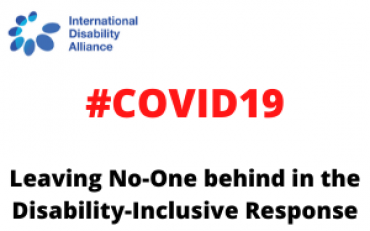This is one story as part of the Voices of People with Disabilities during COVID19 Outbreak series
Names have been changed to protect the individuals mentioned in the story.
“When technology works well, it makes you independent but when it hasn’t been designed appropriately, it can make your life very difficult and cause frustration”, says Aabid.
Aabid is a blind man in his early 40s living in Calcutta, India. He is an educated man and currently works for a professional services firm from home. He currently supports his entire family financially. He shares his daily challenges during the outbreak. The nearest local store is 2 kilometres away and he relies on his personal driver to reach it, however, due to social distancing and restrictions on movement, he is unable to use this service. Even for a small task such as withdrawing money from an ATM, he needs to rely on his neighbours to go with him, as he is need of cash to buy vegetables and fruits. “I don’t want to give away my card to someone and give them my PIN number”. Aabid and his family are Muslims and are currently celebrating Ramadan. Obtaining food is a challenge during COVID-19 and he always has to order food in advance to avoid running out of it. “If I don’t take care of all these things, my family might go hungry”, he says.
“Technology provides a presumed independence for persons with disabilities but I can’t even order essential services or products”. He explains that his biggest challenge during COVID-19 comes when shopping for food online. “The online grocery store app is not accessible and I used to literally plead and appeal to my network for essential groceries”, he says. “You really feel disabled in the real sense”. Due to the lack of accessibility of the app and website, Aabid has had to make an agreement with the department store so he can send via WhatsApp his shopping list.
On top of that, Aabid lives in a large apartment complex and the rule is that you have to collect the grocery from main gate which is 400 meters away from his house. This was a challenge for him as he did not feel confident going by himself with his white cane and carry the bags back. “That is what happens when you make guidelines or rules without consulting persons with disabilities and DPOs”, he says. “It was challenging to convince the authorities to allow the department workers to bring the shopping to my doorstep”.
Aabid explains that official government information is not accessible to persons with disabilities. For instance, PDF files from different ministers are not accessible for screen reader users neither are OCRs. “They make us rely on other people to obtain information”, he says. He is able to follow generic messages as the government sends them via text messages, however, obtaining updated and concrete information in accessible formats is far from a reality. “If technology was made accessible, my life would be so much easier”, he says.
Blind and partially sighted persons are not a homogenous group and have different requirements, for instance, some can rely on Braille, while others prefer electronic formats. For instance, Aabid is not a fluent braille reader and his ideal means of communication would be via email. Moreover, he explains that blind and partially sighted persons have additional challenges under COVID-19. “You are not supposed to be touching things, but for us, we rely on touch for the majority of things, that is very challenging. You are not supposed to touch lift buttons but how do I know what floor I should push?”. Also, in the office, he doesn’t not use his white cane to get around and instead touches the walls. This can mean he is more exposed to the virus. He also denounces that there is no specific information or instructions on how to stay safe for blind persons. “Disability pensions should be given in advance and within public distribution service, disability should be a priority”, he says.

